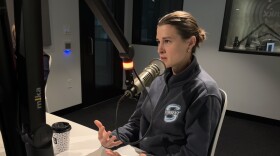The Super Bowl-winning Seattle Seahawks had one. Professional baseball teams have them. And the U.S. Olympic women's ice hockey team found one in Tacoma. We’re talking about a mental skills coach.
And some of this coach's advice to U.S. Olympians could help the average recreational athlete, too.
Professor Colleen Hacker is taking a break from teaching exercise science and sports psychology at Pacific Lutheran University to travel to Russia with the U.S. men's and women's hockey teams for the Winter Olympics. Hacker's job title is “mental skills coach.” And what is that exactly?
"We want them to have the butterflies, but we want to teach them to have the butterflies fly in formation. It is really teaching the athletes to be in control of their best performance,” Hacker said.
Hacker says she works on mental toughness with the U.S. hockey players both individually and in group sessions. She spends most of her time with the women's team where she has a four-year history.
The coach says the techniques she teaches Olympians can be adapted for use by all of us, be that in a high-pressure corporate boardroom, or, say, in youth soccer.
"How much they're committed to their mental skills training changes from a 9-year-old to an Olympian, but not the fundamental skills and strategies,” Hacker said.
For example, Hacker is a fan of what she calls positive "self-talk."
“So what am I saying to myself? If I'm running and I go, 'Aww, my legs are tired. I've got 20 more miles to go,’ [that’s] not helpful. Let's say a soccer player shot and missed the goal. Positive self-talk would be, 'Keep shooting. Keep putting pressure on the keeper. I'll eventually get it,'" she said.
Other parts of her game include concentration training, sticking to a consistent pre-performance routine and imagining success with all your senses.
“I want athletes to feel the equipment. I want them to feel the cold on their cheeks. I want them to taste that sweat on their lips and mouth. I want them to hear the sound of a slap shot and the puck coming off the boards. We want it to be multi-sensory. We want it to be vivid and controllable,” she said.
Hacker says her goal with mental toughness coaching is to boost performance by 3 to 5 percent. She says that could be the difference between silver and gold in Sochi.
Hacker has been on the U.S. coaching staff at four previous Olympics, but those were all Summer Games.
"What the athletes need, their requisite skills and strategies, that doesn't change from Winter to Summer Games," said the longtime PLU professor.
"The compressed schedule is a little different" at the Winter Games, Hacker noted.








